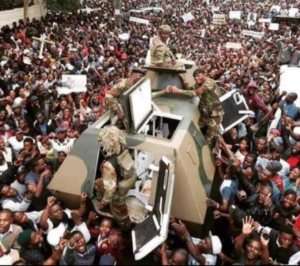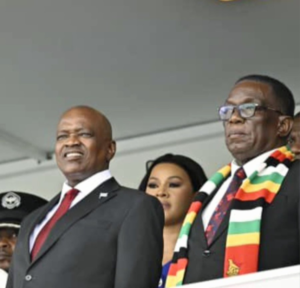POLITICAL CHAOS: FRAUDULENT RECALLS THREATEN DEMOCRACY IN HARARE
In what seems to be a calculated strike against democratic norms, political activist Sengezo Tshabangu, purportedly aligned with Zanu PF, has unleashed a wave of disruption targeting the main opposition party, CCC (Citizens’ Coalition for Change). This latest maneuver has led to the recall of Harare Mayor Ian Makone and his deputy Kudzai Kadzombe, in a move that reeks of political fraud and manipulation.
Tshabangu, who falsely claims to be the CCC interim Secretary-General, has extended his reach by recalling Makone, Kadzombe, and several other councillors. With the backing of his colleagues, including securocrats and political opportunists within Zanu PF, Tshabangu has sought the assistance of Zanu PF Local Government Minister Winston Chitando to oust the legitimately elected council members. This action is not just a strike against the individuals but a blatant assault on the democratic process itself.
The backdrop of this political theater is a series of previous recalls initiated by Tshabangu, including the unseating of 15 MPs which precipitated a slew of by-elections. This pattern of disruption appears to be a deliberate strategy aimed at weakening the main opposition, thus consolidating Zanu PF’s grip on power.
The timing of these recalls is particularly suspect, coinciding with the CCC’s struggle to establish a traditional party structure. The opposition party has faced criticism for its failure to implement a standard political framework, including the lack of a definitive constitution, designated office bearers, and permanent party offices. These organizational shortcomings have inadvertently left a void that opportunists like Tshabangu are exploiting to their advantage.
The method of these recalls follows a disturbing trend of political machinations where individuals masquerade as party officials to undermine the opposition. This underhand tactic undermines the will of the electorate and jeopardizes the foundations of representative governance. It raises serious questions about the state of democracy in Harare, where elected officials can be ousted not by the ballot but through deceitful schemes.
The implications of these recalls are far-reaching. They not only disrupt the administrative operations of Harare’s local government but also sow distrust among the populace regarding the electoral process. Citizens’ faith in their ability to choose their representatives is eroded when elected officials can be removed through such dubious means.
Moreover, these actions set a dangerous precedent where political fraud becomes a tool for power retention rather than serving the electorate. This brand of politics, where power is maintained through manipulation rather than through the provision of services and good governance, is a threat to any democratic society.
The situation in Harare is a stark reminder of the fragility of democratic institutions in the face of political opportunism. As Tshabangu and his allies continue their campaign of recalls, the fundamental principles of democracy are being tested. The reaction of CCC, the government, and civil society to these challenges will be a measure of the robustness of democracy in Harare.
In conclusion, the political landscape of Harare is under siege, not from an external force, but from within its own governance structures. The fraudulent recalls by Tshabangu and the subsequent chaos they have caused raise an alarm for all stakeholders in the democratic process. It is a call to action for the CCC to solidify its organizational integrity, for the government to uphold democratic principles, and for the citizens to remain vigilant against the erosion of their electoral rights. The future of Harare’s democracy hangs in the balance, contingent on the response to these unscrupulous political tactics.



